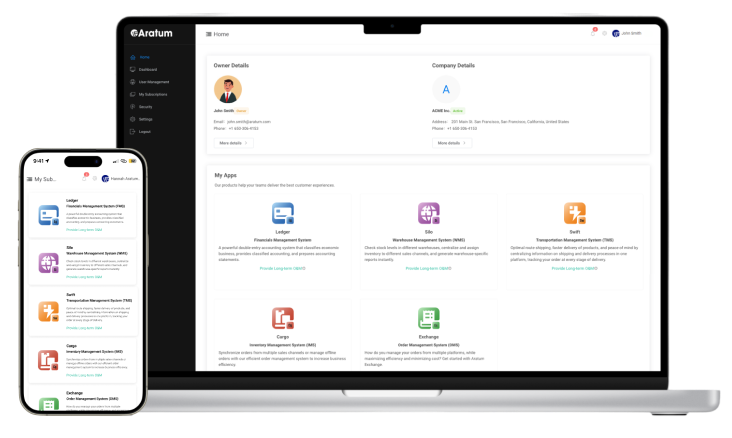Faced with modern transportation logistics complexities, businesses face inefficiencies, soaring costs, and safety concerns when managing their vehicle fleets.
Aratum recognizes the essential role of technology in addressing the challenges. We offer comprehensive fleet management system solutions for route optimization, enhanced safety, and driver cost-effectiveness in your operations.
Vehicle Tracking and Monitoring
Fleet Maintenance Management
Driver Management
Fuel Management
Safety and Compliance
Telematics and IoT Integration
Cost Management
Reporting and Analytics
Fleet Utilization Optimization
Customer Service and Communication
Flexibility and Integration
Utilize real-time GPS tracking to monitor vehicle locations and optimize routes for efficiency and timely deliveries.
Schedule maintenance alerts and track maintenance history to ensure vehicles remain in optimal condition and reduce downtime.
Monitor driver performance and behavior with analytics tools to improve safety and compliance and utilize electronic logging devices (ELDs) to track hours of service.
Monitor fuel consumption and integrate fuel cards to track and analyze fuel efficiency, helping reduce overall fuel costs.
To maintain high safety standards, ensure adherence to safety regulations through incident reporting, compliance monitoring, and driver training programs.
Leverage telematics systems and IoT sensors for real-time vehicle diagnostics and data analytics, enhancing operational efficiency and predictive maintenance.
Track and analyze costs associated with fleet operations, including fuel, maintenance, and other expenses, to optimize budgeting and forecasting.
Generate customizable reports and use data visualization tools to gain insights into fleet performance and make informed decisions with KPI dashboards.
Improve asset utilization by tracking vehicle usage, reducing idle time, and optimizing loads to maximize efficiency.
Provide real-time shipment status updates and communication tools to enhance service quality and facilitate seamless interaction between drivers, dispatchers, and customers.
Support diverse vehicle types and fleet sizes with scalable solutions that grow with business needs and customizable features to meet specific supply chain requirements.
Additionally, cloud-based fleet management system solutions integrate seamlessly with ERP, TMS, and warehouse management systems (WMS) to streamline operations and enhance overall supply chain management.
Manage public transit fleets with real-time tracking, route optimization, and schedule adherence. Improve passenger experience through accurate arrival times and efficient service operations.
A fleet management system optimizes routes for ambulances and medical transport vehicles, ensuring timely arrival for emergency and non-emergency medical services. Monitor vehicle conditions and driver performance to maintain high standards of care.
Ensure the integrity of perishable goods during transport with temperature monitoring and real-time tracking. Optimize routes to reduce transit times and maintain product quality from warehouse to retailer.
Manage utility service fleets to ensure timely response to service calls and maintenance tasks. Use real-time tracking and route optimization to enhance service efficiency and customer satisfaction.
With a fleet management system, optimize the distribution of goods from warehouses to retail stores. Monitor vehicle conditions, fuel usage, and driver performance to ensure cost-effective and timely deliveries.
Track and manage construction vehicles and equipment to optimize usage and enhance safety on job sites. Schedule regular maintenance to prevent downtime and ensure compliance with safety regulations.
Integrate enterprise fleet management with warehouse management and ERP systems to streamline logistics operations. Optimize routes, track shipments in real-time, and ensure timely deliveries while reducing operational costs.
Integrate enterprise fleet management with manufacturing logistics to ensure timely delivery of raw materials and finished products. Monitor and optimize transportation routes to enhance overall supply chain efficiency.
Monitor and manage fleets in remote and harsh environments, ensuring the safety and efficiency of vehicles transporting oil and gas. Use predictive maintenance to reduce downtime and prevent costly breakdowns.
Optimizing dispatch and route planning will enhance the efficiency of police, fire, and emergency medical services. Vehicle status and driver performance will also be monitored to ensure rapid and effective emergency response.
Manage agricultural machinery and transport vehicles to maximize planting, harvesting, and distribution efficiency. Use real-time data to optimize equipment usage and maintenance schedules.

A public transportation company operating in a mid-sized urban area in the USA manages a fleet of 150 buses serving multiple routes across the city, providing essential services to thousands of commuters daily. However, unpredictable schedules, high maintenance costs, increased fuel prices, and inefficient fuel utilization drain the company’s budget.
The company sought our fleet management system to optimize its operations:
Fleet management is the administration and coordination of a company’s vehicle fleet. It involves overseeing vehicle use, maintenance, and tracking to improve efficiency, safety, and cost-effectiveness.
Fleet management is crucial for optimizing vehicle use, reducing operating costs, ensuring regulatory compliance, improving driver safety, and enhancing overall operational efficiency.
A fleet management system is a comprehensive software solution designed to help businesses manage and optimize vehicle fleets. It encompasses various functionalities such as vehicle tracking, maintenance management, driver monitoring, fuel management, and safety compliance to improve operational efficiency and reduce costs.
Fleet management systems provide GPS real-time location data for vehicles, enabling efficient route planning, improved dispatching, enhanced security, and monitoring of driver behavior. This ultimately leads to optimized operations and improved efficiency.
Telematics refers to integrating telecommunications and informatics technologies in fleet management systems. It involves collecting, transmitting, and analyzing vehicle data using GPS, sensors, and onboard diagnostics to monitor vehicle performance, track location, optimize routes, and improve overall operational efficiency and safety.
Implementing a fleet management system can save costs through improved fuel efficiency, reduced maintenance expenses, optimized vehicle utilization, lower insurance premiums, and decreased administrative costs.
A fleet management system improves driver safety by monitoring driver behavior, providing training programs, ensuring vehicles are well-maintained, and using telematics to alert drivers to potential hazards.
Fleet management ensures compliance by keeping accurate records, monitoring driver hours, ensuring vehicle maintenance meets regulatory standards, and using software to manage and automate compliance-related tasks.
Fleet management systems can manage many vehicles, including cars, trucks, vans, buses, motorcycles, and specialized vehicles used in industries like construction, logistics, and public transportation.
Fleet management software tracks fuel usage, monitors fuel efficiency, integrates with fuel card systems, and provides analytics to identify areas where fuel consumption can be reduced.
Yes, particularly Aratum’s fleet management systems are highly customizable, allowing businesses to tailor features and reports to their specific operational requirements and industry regulations.
A Transportation Management System (TMS) primarily focuses on planning and executing the movement of goods. At the same time, a Fleet Management System (FMS) is centered around managing the fleet of vehicles used for transportation, including vehicle tracking, maintenance, and driver management. They serve complementary functions within logistics and transportation operations.

To implement an effective fleet management system in your industry, you can rely on Aratum solutions tailored to your business requirements to help you get started and gain visibility, efficiency, and resiliency.
Aratum is a globally recognized software provider specializing in developing supply chain management solutions. Our software solutions incorporate advanced algorithms and optimized data structures to facilitate efficient data processing and information dissemination across organizations.
Leveraging cutting-edge technologies such as machine learning and artificial intelligence, the software enables automated decision-making and real-time analytics, enhancing supply chain visibility and improving overall performance.
With a focus on delivering robust and scalable solutions, Aratum is committed to providing our clients with the tools necessary to optimize their supply chain operations and gain a competitive edge in your respective markets.






© 2024 Aratum or an Aratum affiliate company. All rights reserved. No part of this publication may be reproduced or transmitted in any form or for any purpose without the express permission of Aratum or an Aratum affiliate company. The information contained herein may be changed without prior notice. Some software products marketed by Aratum and its distributors contain proprietary software components of other software vendors. National product specifications may vary. These materials are provided by Aratum or an Aratum affiliate company for informational purposes only, without representation or warranty of any kind, and Aratum or its affiliated companies shall not be liable for errors or omissions with respect to the materials. The only warranties for Aratum or Aratum affiliate company products and services are those that are set forth in the express warranty statements accompanying such products and services, if any. Nothing herein should be construed as constituting an additional warranty. In particular, Aratum or its affiliated companies have no obligation to pursue any course of business outlined in this document or any related presentation, or to develop or release any functionality mentioned therein. This document, or any related presentation, and Aratum’s or its affiliated companies’ strategy and possible future developments, products, and/or platforms, directions, and functionality are all subject to change and may be changed by Aratum or its affiliated companies at any time for any reason without notice. The information in this document is not a commitment, promise, or legal obligation to deliver any material, code, or functionality. All forward-looking statements are subject to various risks and uncertainties that could cause actual results to differ materially from expectations. Readers are cautioned not to place undue reliance on these forward-looking statements, and they should not be relied upon in making purchasing decisions. Aratum and other Aratum products and services mentioned herein as well as their respective logos are trademarks or registered trademarks of Aratum (or an Aratum affiliate company) globally. All other product and service names mentioned are the trademarks of their respective companies. See aratum.com for additional trademark information and notices.